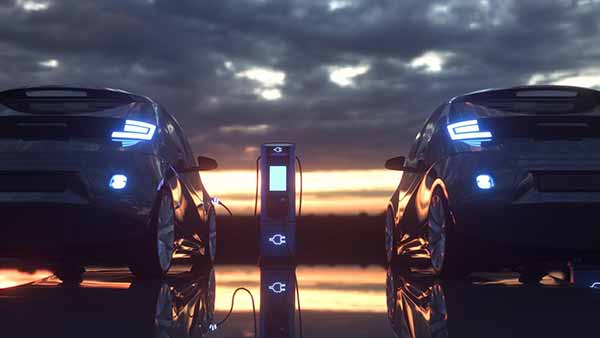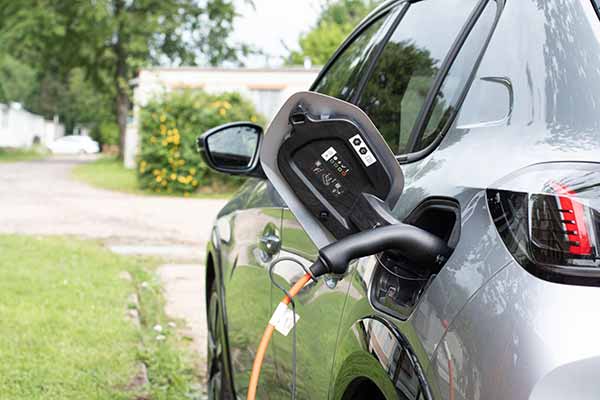As you become more conscientious about the environment and the perils of climate change, maybe you’ve started to consider buying an electric vehicle. It feels pretty good to think about doing your part to save the planet, but you also may be wondering, “How much money do you save with an electric car?”
While electric power is undoubtedly less expensive fuel for cars, the upfront purchase price of an electric vehicle (EV) can be quite a bit higher than that of a comparable gas-fueled vehicle. Per research by the Natural Resources Defense Council, EVs can be nearly $20,000 more.
Still, manufacturer rebates and tax incentives often offset the initial cost of investing in an electric car. For example, federal tax and state incentives can help put as much as $9,000 or more toward the price of your new electric vehicle, depending on where you live. Some states, like California, have better incentives than others.
However, upfront costs aren’t the whole story, and it can be tough to determine precisely how much you’ll save with an electric car. That’s because there are so many different factors involved. For example, many electric cars tend to be luxury vehicles, making it more challenging to make a fair comparison. Other considerations are the cost of electricity state by state, the fluctuation of fuel costs, and maintenance costs, among others.
We’ll explore all this and more as we cover the ubiquitous question on so many Americans‘ minds: How much money can you save if you buy an electric vehicle?
How Do Electric Vehicles Save Money?
All-electric cars have fewer moving parts than traditional cars with internal combustion engines. Things such as spark plugs, transmissions, radiators, fuel filters, exhausts, and other gasoline-specific parts leave you with fewer maintenance tasks like oil changes, for example.
Even if you choose a plug-in hybrid electric vehicle with an internal combustion engine, your maintenance costs will be lower. Gas-run vehicles take up an average of $3,356 in your budget each year to pay for fuel, taxes, and insurance, while electric cars average $2,722.
Of course, as gas prices fluctuate, these numbers can change. Regardless of how you look at it though, your fuel costs will be nil without ever having to gas up. Want to get a better idea of how much you’ll save? Check out this calculator from the Department of Energy.
Even plug-in hybrid electric vehicles (PHEVs) save money. Unlike all-electric vehicles, which use no gasoline, plug-in hybrid cars have a fuel backup to power the car if the battery’s charge runs out.
While this means there’s the cost for charging the vehicle and refueling, PHEVs have better fuel efficiency than conventional gasoline-based vehicles and function more like hybrid vehicles when switched from battery power to fuel.
Plug-in hybrids use about 30% to 60% less gasoline than traditional gasoline-powered engines. In addition, their internal combustion engine is used to recharge the car’s battery, saving on electricity costs and reducing the need for hours of charging.
Does the Government Offer Incentives for Buying an Electric Vehicle?
Yes! There are government incentives for going electric when you buy your new car. How much and what kinds of incentives you’ll be entitled to will depend on where you live and what kind of electric vehicle you buy.
The Build Back Better bill includes a federal tax credit for EVs of $12,500 — that’s a significant increase over the $7,500 currently available for qualifying EVs and their buyers.
Keeping in mind that things may change, here’s what it looks like:
The base amount is the same $4,000 that consumers enjoy today, and there’s an additional $3,500 if the electric car’s battery pack has at least a 40 kWh capacity. The gas tank can’t hold more than 2.5 gallons of gas for hybrid vehicles.
How do you get that $5,000 bump? $4,500 of the federal tax credit will depend on if the automaker built your electric vehicle within the United States and with union labor. You would get an additional $500 if the automaker used a battery made in the U.S.
Right now, the only qualifying EVs are the Chevrolet Bolt and Chevrolet Bolt EUV.
Is Owning an Electric Car Worth It?
To begin with, you’ll probably feel better about your environmental impact. We think that counts for a lot.
There’s a myth that EVs simply transfer their emissions from the tailpipe to the power station. Of course, making electricity creates emissions, but many electric car owners charge up at night when there’s a lower demand on our nation’s power grids.
The BBC published research that shows the emissions from EVs may be up to 70% less, depending on where you reside.
Electric cars are easier to “fuel up” because all you need to do is plug your vehicle in when you arrive home, and your vehicle gets powered while you’re busy with other things like sleeping or spending time with your family. Looking for gas stations or standing by your gas tank in the cold (or hot) weather becomes a thing of the past.
Owning an electric vehicle means much less time spent at the dealership getting oil changes and being subjected to upsell services. In addition, since electric cars are leaner on moving parts in their engines, they require much less maintenance, as previously mentioned.
When you own an electric vehicle, you get to take advantage of such perks as carpool lanes and free parking — even being able to charge up at the same time.
Finally, for the technophiles among us, you can have a great deal of fun geeking out on all the cool technology, state-of-the-art comfort, safety features, and sleek style of today’s modern electric cars.
Can I Charge My Electric Car at Home?
You can charge your electric car at home using a dedicated EV charging station. Your home charging point will give you faster charging speeds, as well as built-in safety features.
Likewise, you can use a standard three-pin plug with an electric vehicle supply equipment (EVSE) cable, but you should only do it if you absolutely have to.
Should you charge your electric car every night? Experts say no unless it’s unavoidable. If you charge every night, it could potentially cut short the lifespan of your car’s battery pack.
Enter your ZIP Code and compare electricity rates
Do Electric Cars Increase Your Electric Bill?
The short answer is probably, though your electricity costs shouldn’t increase by much. Let’s face it, any new appliance you install in your home that uses electricity is bound to add to your power bill. And, the impact on your electricity bill depends on a few different factors: your vehicle, driving needs, and of course, the electricity rate you pay per kilowatt-hour. As with anything you own that’s electronic, some electric vehicles are more efficient than others.
To measure the cost of “fueling up” your EV, instead of measuring efficiency in miles per gallon like you would with a regular gas-run car, EVs measure mileage in kilowatt-hours per 100 miles.
Another way to measure efficiency in an electric car is to measure the miles per gallon equivalent (MPGe). And finally, another way is to see how many kilowatts you need to charge your car thoroughly, dividing that by the number of miles you get per full charge.
There’s a terrific tool available from the U.S. Department of Energy if you’re curious about how electric cars compare side-by-side concerning efficiency.
Another great resource is the Environmental Protection Agency’s electric vehicle label, which can give you a lot of information about annual “fuel” costs, the range per charge you can expect from your EV, and more.
Your Home Energy Plan Makes a Big Difference When It Comes to Charging Your EV
Your energy plan can make a big difference in how much you spend charging your car. Electricity rates are typically more stable than gas prices, but you may want to choose a fixed-rate plan for your home to be sure of that. Other things to look for are:
- Your kilowatt-hour rate
- Any time-of-use plans that may be available to you (for example, off-peak hours may be less expensive for charging your car)
- Other benefits that your power provider may offer
If you live in a deregulated area, like Texas, you have the power to choose, so do your research and select the best utility provider for you.
Regardless of your kWh rate and plan, most EV drivers find that electric fuel is cheaper than gas, and we think you will too.
To limit the impact on your cost of electricity, try to take advantage of free and low-cost public vehicle charging stations whenever possible. Many shopping malls, plazas, office complexes, government buildings, and universities now have a few in their parking lots. As a bonus, you’ll also score a premium parking spot!
Finally, consider installing solar panels in your home. Solar energy can cut costs considerably and you’ll have the added benefit of doing even more for the environment.
Are There Plenty of Public Charging Stations Around?
Reuters reported in September 2021 that according to the U.S. Department of Energy, the U.S. had over 40,000 charging stations and approximately 120,000 charging points — most are Level 2 chargers. Charger distribution is sporadic across the country, with most located in California.
There’s a push to heavily expand EV charging stations, with a hefty $7.5 billion plan to achieve the goal over five years.
The U.S. Department of Energy has provided a terrific tool in the form of a comprehensive map of charging stations around the country.
How Much Does It Cost to Give My Electric Car a Full Charge?
The cost of electricity is different everywhere, so there’s no finite answer to this question. However, on average, in California charging an EV costs about $0.18 per kWh. So, charging a 40-kWh battery for a car such as a Nissan Leaf would take about $7 to fill up.
There are three classifications of EV chargers:
- Level 1 chargers work on a regular 110-V electrical outlet (like what you use at home), and they take a while to charge your car’s battery. Level 1 chargers are the least expensive to use.
- Level 2 chargers put out a higher power, using a 240-V outlet such as what your water heater or oven might use. The Level 2 charger can top off your electric car’s battery in around five hours.
- DC fast chargers (DCFC) are the most costly to install and use; however, they do give the fastest boost for your buck when it comes to EV charging. These chargers allow for a direct current into your car’s battery without having to convert it first from an alternating current, as with Level 1 and Level 2 chargers. A DCFC can top off your battery in less than an hour with its 480-V outlet.
Do Electric Cars Really Save You Money?
Electric vehicle owners seem to think so. According to one consumer report, fuel savings alone came to about 60%.
Next, the study found that regarding maintenance costs, electric car owners benefit from fewer trips to the mechanic for basic upkeep like oil changes, saving them about half as much as gas fueled car owners.
Overall, EV ownership savings add up to approximately $6,000- $10,000 over the lifetime of the car.
Electric cars can save you a bundle on fuel costs, maintenance, and can even pay you back a portion of your upfront purchase price in the form of rebates and government incentives.
Finally, electric cars may be a significant game changer for the state of our planet’s health, a savings that may be even more valuable than money.
Brought to you by energysavings.com
All images licensed from Adobe Stock.
Featured image:



